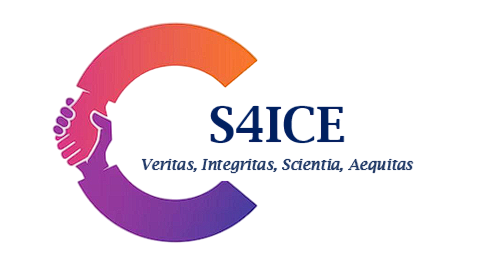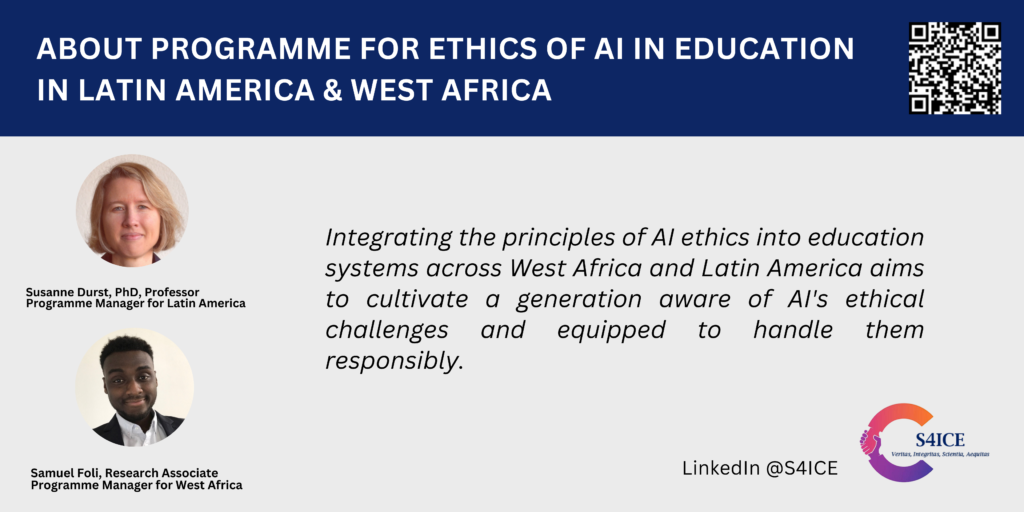Project Proposal: Ethics of AI in Education in Ghana
Introduction
Artificial intelligence (AI) is rapidly transforming various sectors, including education. However, this transformation is accompanied by major ethical challenges, such as algorithmic biases, data confidentiality and liability issues. The project proposes to integrate the principles of AI ethics into Ghana’s education systems, targeting pupils, students, teachers and administrations in primary, secondary and university education. The aim is to create a generation that is aware of the ethical issues associated with AI and capable of dealing with them responsibly.
Project objectives
- Develop a Curriculum on AI Ethics: Create and implement specific educational modules on the principles of AI ethics, adapted to the needs of Ghana.
- Strengthen the capacities of teachers and administrators: Train teachers and administrators to teach AI ethics concepts effectively and to promote a culture of responsibility and ethical awareness in their institutions.
- Engaging Pupils and Students: Equip pupils and students with the knowledge and skills they need to understand and defend AI ethics in their communities.
- Promote Community Involvement: Encourage community involvement in AI ethical practices through educational awareness.
Project target audience
- Pupils and students: Primary, secondary and university students who will be the future players in ethical AI.
- Teachers: Primary, secondary and university teachers who can integrate the principles of AI ethics into their teaching methods.
- Administrations: Administrations of primary, secondary and university educational establishments responsible for integrating and managing the ethical principles of AI.
- Communities: Local communities that can benefit from AI’s ethical practices and support a mentality of responsibility.
Project methodology
- Curriculum development: Develop comprehensive and culturally relevant modules on topics such as algorithmic bias, data privacy, transparency and accountability. Align the content with existing educational standards and adapt it to the specific needs and contexts of Ghana.
- Training for Teachers and Administrators: Organise workshops and training sessions to provide teachers and administrators with the knowledge, resources and tools they need to effectively teach and manage the principles of AI ethics. Create a network of trained professionals to support ongoing collaboration and sharing of best practices.
- Pupil and Student Awareness: Implement interactive, hands-on learning experiences such as ethical AI projects, responsible design challenges and technology ethics clubs. Encourage critical thinking and problem-solving skills by challenging pupils and students to develop innovative solutions to the ethical challenges of AI.
Project limits and boundaries
- Limitations: Infrastructure challenges, cultural barriers, commitment from teachers and administrations, limited access to technology.
- Scope: Targeting educational establishments in Ghana, in particular primary, secondary and university levels.
Expected results
- Student Engagement: Implement interactive, hands-on learning experiences such as ethical AI projects, responsible design challenges and technology ethics clubs. Encourage critical thinking and problem-solving skills by challenging students to develop innovative solutions to the ethical challenges of AI.
- Community Outreach: Organise community events and campaigns to raise awareness of the benefits of AI ethics and engage residents in responsible practices. Collaborate with local businesses, NGOs and government agencies to support community AI ethics initiatives.
- Involvement of Administrations: Integrate ethical policies and procedures into educational institutions to ensure consistent and sustained implementation of AI ethical principles.
Project implications
- Ethical implications: Reducing bias and discriminatory practices, increasing transparency and accountability in the use of AI.
- Social Implications: Empowered communities improved educational outcomes, improved quality of life through ethical use of technology.
- Educational implications: Curriculum innovation, long-term educational impact.
Outlook
- Extension to other African countries.
- Integration of digital learning platforms on the ethics of AI.
- Community-led sustainability projects.
- Extension to rural and disadvantaged areas.
- Participation in conferences and educational forums on the ethics of AI.
Conclusion
The “AI Ethics in Education in Ghana” initiative aims to create a responsible future by integrating the ethical principles of AI into education systems. By targeting pupils, students, teachers and administrations, this project will equip the next generation with the knowledge and skills to responsibly address the ethical challenges associated with AI.
Call for Donors and Funders
Your support is essential to making this project a reality. By investing in this initiative, you are helping to train a generation capable of managing AI technologies ethically and responsibly. Together, we can promote a fair and transparent use of AI that will benefit not only Ghana, but also the rest of the world.
Thank you for your consideration and support for this crucial project for the future of education and technological ethics in Ghana.
The English version is the original version.




